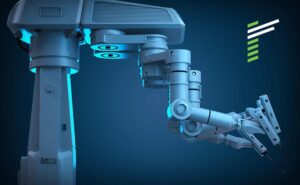The last few years have seen a rapid transformation in the world of work, with multiple events triggering unprecedented changes across all industries. The COVID-19 pandemic forced a sudden rise in remote work, leading to a surge in demand for new technologies and ways of working. Meanwhile, the war in Ukraine and the pandemic have created significant uncertainty and supply chain and labour market shortages.
Although some industries are starting to recover, others have undergone permanent changes. And more upheaval may be on the horizon. With the arrival of AI, the future of work is at a tipping point, with significant implications for businesses and workers alike.
The State of AI and Jobs Today — And Tomorrow
The influence of AI and other emerging technologies is already being felt across numerous industries. And the impact is only going to grow from here. Experts predict that in the next five years, we’re going to see an unparalleled shift in jobs.
According to the World Economic Forum’s Future of Jobs Report 2023, the labour market is in for significant structural change, with up to 23% of jobs facing upheaval in the coming years. While many positions are predicted to decline significantly, entirely new roles will also emerge in response to AI and other technologies.
The report, which focused on 45 major economies and encompassed 673 workers, suggests that 69 million new jobs will emerge over the next five years. However, this could be accompanied by the elimination of 83 million jobs, resulting in a 14 million net decrease. That accounts for 2% of current employment, representing a major shift in the labour market.
The report also notes that although AI may create 97 million new roles, these jobs will differ significantly from the ones AI is set to eliminate over the next five years.
AI Is Set to Reshape Many Types of Jobs
Currently, the primary conversation around AI centres on the impact of large language models (LLMs), such as ChatGPT-4. While there are many other types of AI technology, many believe LLMs will have the most significant and immediate impact on jobs across all industries.
It’s estimated that up to 40% of working hours across all industries will be impacted by LLMs in the coming years. As language-related tasks account for 62% of total work time in the US, it’s clear that few roles will remain unaffected by AI. That’s why it’s essential for both organizations and employees to adapt quickly to avoid being left behind.
AI is already being implemented in many basic repetitive and mundane tasks, such as data entry and processing. However, the implementation of AI is expected to accelerate rapidly across industries. So many employees are now faced with the challenge of developing skills for the new jobs that AI will create before their current roles become obsolete.
Making AI Work Still Requires a Human Touch
While generative AI provides powerful tools, it’s important to remember they are just that — tools. As such, they require careful application by human experts, who have to possess the skills and expertise to manage the AI’s use. Achieving the right balance between AI and human work is vital to unlocking the full potential of both.
Deploying AI tools in a way that makes this possible is a significant challenge that requires effective leadership and coordination across all sectors. Many organizations are already shifting toward preparation for the future of work.
A recent survey of companies that have adopted AI in at least one area showed that 33% had hired AI data scientists, while 30% had recruited machine learning engineers. These numbers demonstrate a commitment to long-term development and implementation. In addition to integrating AI, companies must have robust solutions in place to evaluate and measure progress towards their AI goals.
What Employees Can Do to Develop AI-Proof Skillsets
For many organizations, finding employees with AI skills is a top priority. In a recent survey of leading companies, 53% reported actively seeking experienced professionals with AI skills, while 34% are investing in retraining their existing teams.
As AI continues to reshape the job market, employees should take proactive steps to AI-proof their jobs. One way to do this is by becoming a true subject matter expert in their field. By developing deep expertise and knowledge, employees can position themselves as invaluable assets to their organizations, even in the face of new technologies.
Participating in strategic processes and driving innovation are also key ways for employees to future-proof their jobs. Taking part in any opportunity to train and adapt your AI skills will help you get ahead and maintain your role. As workplaces become increasingly complex and new technologies are introduced, companies need employees who can help navigate these changes and provide strategic insights. A focus on strategy is therefore highly valuable for employees who want to remain relevant and indispensable in the face of evolving business demands.
Preparing Your Organization for the Future of Work
AI is set to bring about a wide range of changes across all industries, presenting both challenges and opportunities for businesses and employees. Organizations that take proactive steps to prepare for the future will be better positioned to leverage AI effectively and gain a competitive edge.
Renoir provides a wide range of services that can prepare your organization for the future. We can help you achieve digital transformation to fully utilize AI and other new technologies. Our data and analytics solutions empower your workforce to do more.
Talk with one of our consultants today to see how your organization can make AI an asset for your teams.










